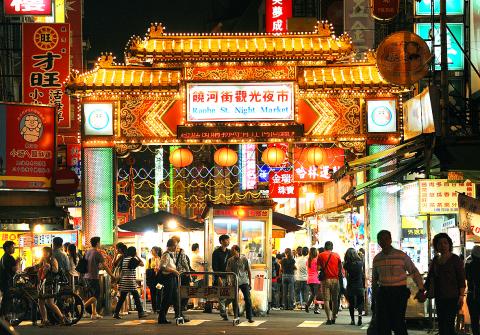|
FOOD ADDITIVE SCARE: Night markets
suffer while food scare anxiety escalates
Staff Writer, with CNA

Shoppers visit the Raohe St Night
Market in Taipei on Monday.
Photo: Fang Pin-chao, Taipei Times
Night markets, one of the nation¡¦s major
tourist attractions, have been hit hard by the escalating chemical contamination
scare.
Shihlin Night Market in Taipei is among the hardest hit because some of its cold
drinks and shaved ice vendors were found to have used clouding agents
contaminated with di(2-ethylhexyl) phthalate, or DEHP.
Clouding agents are additives commonly used in sports drinks, juices, fruit jams
and powders, to make products more visually appealing to consumers.
A shaved ice vendor at Liuho Night Market in Greater Kaohsiung also said his
business has declined substantially since the DEHP scare came to light early
last week.
The contamination of food and beverages has so far been traced to two additive
makers ¡X Yu Shen Chemical Co used DEHP and Pin Han Perfumery Co used diisononyl
phthalate, or DINP ¡X in clouding agents sold to food manufacturers.
Data from the Department of Health showed that 215 manufacturers may have used
clouding agents from either Yu Shen or Pin Han, with the number of potentially
contaminated products totaling 506.
Night markets nationwide have long been one of the most frequented destinations
for foreign tourists.
Located in a bustling Taipei district with convenient transportation links,
Shihlin Night Market is the country¡¦s most popular night market. However, the
food scare has scared away consumers and hurt its image.
In order to regain consumer confidence, food manufacturers and vendors should
exercise good judgement and health authorities should strengthen law enforcement
to ensure food safety, tourism promoters said.
To limit the adverse impact of the scare, Greater Kaohsiung¡¦s consumer
protection and health officials inspected seven stalls at Liuho Night Market to
collect samples of fruit jams, jellies and fruit juice concentrates to see if
their additives contained any banned chemicals.
Chuang Chi-chang (²ø¨ä³¹), head of the Liuho Night Market Management Commission,
accompanied city officials on visits to the stalls. All the vendors readily
provided food samples for checks. Test results are expected to be available
within seven days.
¡§If your products meet required standards, city authorities will issue
certificates for vendors to display at the front of their stalls,¡¨ Chuang said,
adding that this is the best strategy to regain consumers¡¦ confidence and trust.
Popular night markets in other cities, such as Taichung, Greater Tainan and New
Taipei City (·s¥_¥«), have also seen sales decline significantly over the past
week.
As night markets have become an integral part of people¡¦s daily lives and a
major tourist destination, the private and public sector should work together to
re-establish their reputation and appeal, a cultural worker in Taichung said.
On Monday, the Ministry of Economic Affairs stripped Good Manufacturing Practice
(GMP) certification from seven brand-name products for containing banned
chemicals.
Among the tainted products was the S11 probiotic supplement produced by GeneFerm
Biotechnology Co for Taiwan Tobacco & Liquor Corp (TTLC).
TTLC vice president Su Gui-yang (Ĭ¬Ñ¶§) said consumers would get a full refund if
they return items on the recall list, including partially consumed products.
¡§All DEHP-tainted S11 dietary supplements have been pulled off store shelves and
destroyed,¡¨ he added.
|
![]()
![]()
![]()